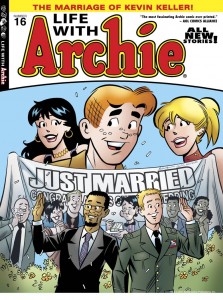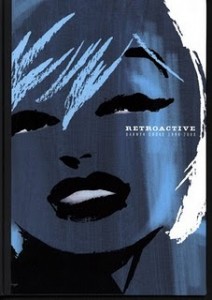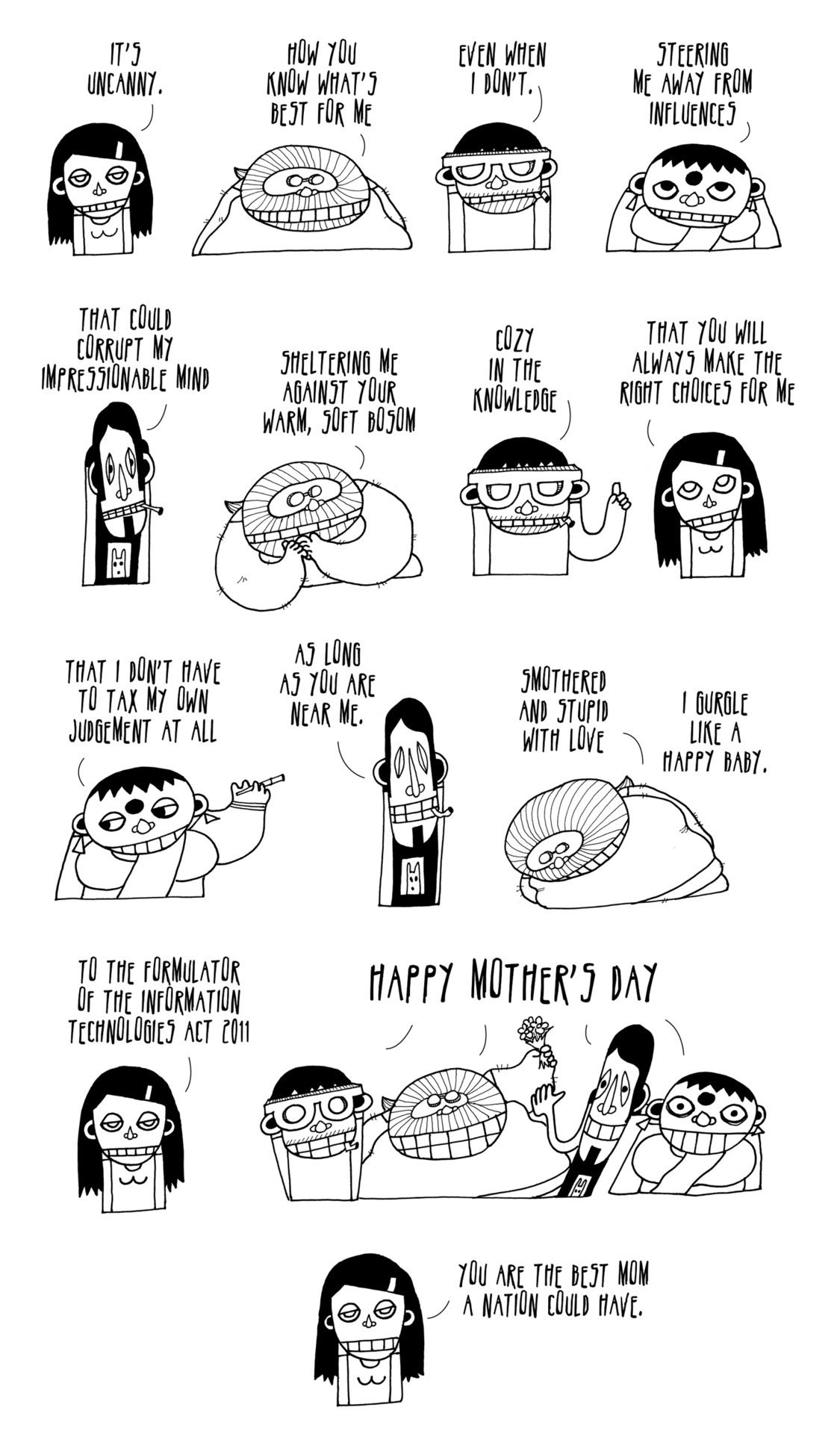Why are books challenged in public schools and, even more importantly, why are some challenges successful in getting books banned while others fail? A new comprehensive study by the Columbia Missourian is attempting to find out. The periodical is currently…
211 search results for "diary"
LGBT Characters and the Comics Code Authority
 The last decade has seen a spate of LGBT characters introduced, ‘outed,’ or united in marriage with same-sex partners in mainstream comics. Unfortunately, these LGBT storylines have drawn criticism and calls for censorship from some quarters, particularly the group One Million Moms, a subsidiary of the American Family Association. The moms have pressured retailer Toys ‘R’ Us not to stock the Life With Archie issue featuring Kevin Keller’s wedding, and later blacklisted both DC and Marvel for “placing these gay characters on pedestals in a positive light,” according to a post from ICv2. But as Alan Kistler points out in an extensive post for Comic Book Resources, LGBT characters and themes have a long history in comics, despite the self-censorship that ruled the industry for decades. CBLDF blogger Maren Williams takes a look at Kistler’s article after the jump.
The last decade has seen a spate of LGBT characters introduced, ‘outed,’ or united in marriage with same-sex partners in mainstream comics. Unfortunately, these LGBT storylines have drawn criticism and calls for censorship from some quarters, particularly the group One Million Moms, a subsidiary of the American Family Association. The moms have pressured retailer Toys ‘R’ Us not to stock the Life With Archie issue featuring Kevin Keller’s wedding, and later blacklisted both DC and Marvel for “placing these gay characters on pedestals in a positive light,” according to a post from ICv2. But as Alan Kistler points out in an extensive post for Comic Book Resources, LGBT characters and themes have a long history in comics, despite the self-censorship that ruled the industry for decades. CBLDF blogger Maren Williams takes a look at Kistler’s article after the jump.
Critical Fail: The Censorship of RPGs
by Justin Brown
Let’s say you’ve been reading up on the CBLDF coverage of the top 10 banned books of 2011, which included a graphic novel in the #2 spot, and you want to vent your frustrations by gathering with a group of friends to play a trending role-playing-game. You amble amongst local comic shops, book stores and libraries to obtain the newest player manual only to discover that it has been banned or censored to the point of being unplayable. (I mean, who wants to try to bewilder a bug-bear with a rubber-mallet-of-kindness? Ok, that scenario is a little farfetched, but you get the picture.) According to a recent article on ICv2, censorship has branched out to include RPGs for many of the same reasons that comic books have been challenged and censored.
More on RPG censorship after the jump.
Webcomic Takes a Stab at Indian Online Content Laws
by Joe Izenman
Only a few months have passed since political cartoonist Aseem Trivedi faced charges of treason for mocking the state. But that hasn’t stopped at least one webcomic artist from taking a sarcastic Mother’s Day shot at Indian Parliament’s year-old amendments to their Information Technology Act, which introduced an extraordinary set of restrictions and punishments for a broad range of online content violations.
Indian webcomic Crocodile In Water, Tiger On Land—a self-described purveyor of “below-the-belt cheap shots in comic form” has this to say in “thanks” to India’s lawmakers:
More details about the impact of India’s restrictive policies after the jump…
THE GUARDIAN Analyzes Tintin in the Congo Case
In February, Belgian courts ruled that Tintin in the Congo should not be removed from bookstore shelves over charges that it violated Belgian laws regarding racism and inciting racial hatred. The court ruled that the book, which was serialized from 1930 to 1931 and collected in 1946 with significant revisions, was a product of its time and did not intend to incite racial hatred. This week, The Guardian reposted an analysis that Jogchum Vrielink wrote about the case and its impact on the sale of the book.
Click through for excerpts from the analysis.
Graphic Novel THE COLOR OF EARTH Is Second Most Frequently Challenged Book of 2011
 This week, the American Library Association’s Office of Intellectual Freedom released their list of the Top Ten Most Frequently Challenged Books of 2011. The second-most challenged book on that list was The Color of Earth, a critically-acclaimed Korean manwha, or comic book, series. In spite of numerous positive reviews from Booklist, Publishers Weekly, the School Library Journal, and other outlets that praise the book as “richly literate and imaginative” (Booklist) and “a work of great humanity” (Publishers Weekly), the coming-of-age tale is challenged due to nudity, sexual content, and suitability for age group.
This week, the American Library Association’s Office of Intellectual Freedom released their list of the Top Ten Most Frequently Challenged Books of 2011. The second-most challenged book on that list was The Color of Earth, a critically-acclaimed Korean manwha, or comic book, series. In spite of numerous positive reviews from Booklist, Publishers Weekly, the School Library Journal, and other outlets that praise the book as “richly literate and imaginative” (Booklist) and “a work of great humanity” (Publishers Weekly), the coming-of-age tale is challenged due to nudity, sexual content, and suitability for age group.
CBLDF is an official sponsor of Banned Books Week, which will occur this September 30 – October 6. Banned Books Week is dedicated to “celebrating the freedom to read and the importance of the First Amendment.” CBLDF is currently creating tools for retailers and librarians to raise awareness of important challenged and banned comics and graphic novels during this year’s 30th Anniversary Banned Books Week Celebration. To get a headstart on the festivities, please check out the CBLDF Rewards Zone, where we have items such as our I Read Banned Comics t-shirt available to help raise money for this important program.
Click through for more on the story…
In the Wake of Protest and Public Scrutiny, Arizona Legislature Pulls Back Electronic Speech Censorship Bill
ABC 15, an Arizona affiliate is reporting that a sweeping electronic media censorship bill passed by the state’s legislature last week and headed to Governor Jan Brewer’s desk for signature has been pulled back in the wake of public outcry. Last week, CBLDF called attention to the bill and its constitutional deficiencies, helping to spark a wave of media coverage that turned the tide against the bill.
Lawmakers intended the law to protect people from online stalkers and bullies, but the law was so broadly worded that it would apply to the internet as a whole, not one-to-one communications, and the legislation does a poor job of defining the material that would run afoul of the law. As a result, anyone posting constitutionally-protected material could face charges if an individual deemed the material was intended to “annoy,” “offend,” “harass,” or “terrify.”
Read more about Arizona House Bill 2549 after the jump…
Arizona Legislature Passes Sweeping Electronic Speech Censorship Bill
Yesterday, the Arizona legislature passed Arizona House Bill 2549, which would update the state’s telephone harassment law to apply to the Internet and other electronic communications. The bill is sweepingly broad, and would make it a crime to communicate via electronic means speech that is intended to “annoy,” “offend,” “harass” or “terrify,” as well as certain sexual speech. Because the bill is not limited to one-to-one communications, H.B. 2549 would apply to the Internet as a whole, thus criminalizing all manner of writing, cartoons, and other protected material the state finds offensive or annoying. The Bill is currently on Governor Jan Brewer’s desk awaiting her decision on whether to veto or sign the bill.
Media Coalition, a trade association protecting the First Amendment rights of content industries, whose membership includes CBLDF, has been active in opposing the bill. On March 14, Media Coalition sent a memo to the Senate Rules Committee regarding constitutional infirmities in H.B. 2549. Yesterday they sent a letter to Governor Brewer urging her to veto the bill.
If passed, the law could create vulnerabilities for cartoonists and publishers who publish material online intended to shock, satirize, and criticize. Beyond the example of the Mohammad cartoons listed in the Media Coalition letter, the taboo-pushing work of cartoonists like R. Crumb, Johnny Ryan, and Ivan Brunetti would potentially be vulnerable to prosecution, as could incendiary works such as Frank Miller’s Holy Terror and Dave Sim’s Cerebus. Similarly, the culture of message boards, within and beyond comics, would be imperiled. With more titles released digitally each week, and an extremely active online ecosystem of professional and fan exchange, laws like this one are extremely worrisome for the creators, publishers, and readers of comics.
Virtual Read-out of Banned Books Is Launched
 Readers from across the United States and around the world are demonstrating their support for free speech by participating in a virtual read-out of banned and challenged books that will culminate during the 29th annual Banned Books Week (Sept. 24-Oct. 1), the only national celebration of the freedom to read. Individuals, libraries and bookstores are uploading videos to a special channel on YouTube, submitting either a reading of up to two minutes or a description of a local book challenge of up to three minutes.
Readers from across the United States and around the world are demonstrating their support for free speech by participating in a virtual read-out of banned and challenged books that will culminate during the 29th annual Banned Books Week (Sept. 24-Oct. 1), the only national celebration of the freedom to read. Individuals, libraries and bookstores are uploading videos to a special channel on YouTube, submitting either a reading of up to two minutes or a description of a local book challenge of up to three minutes.
CBLDF is a sponsor of Banned Books Week. Keep reading for more about the virtual read-out.
Start Your Week with Auctions Benefiting the CBLDF
 Whether CBLDF runs it or an outside party graciously donates their time and effort, online auctions are one way CBLDF raises the money it needs to defend cases such as the Canada Customs Case. Right now, you’ll be able to find a number of online auctions benefiting CBLDF.
Whether CBLDF runs it or an outside party graciously donates their time and effort, online auctions are one way CBLDF raises the money it needs to defend cases such as the Canada Customs Case. Right now, you’ll be able to find a number of online auctions benefiting CBLDF.
CBLDF has a number of exclusive items up for auction right now. Read on for more!
Support CBLDF’s defense of free speech by making a donation or becoming a member today!
